|
|
|
Sort Order |
|
|
|
Items / Page
|
|
|
|
|
|
|
| Srl | Item |
| 1 |
ID:
137551
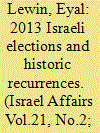

|
|
|
|
|
| Summary/Abstract |
The 2013 election campaign in Israel shows, at first glance, some unanticipated results and unexpected reactions of several political actors. Three events in particular can be noted: (1) the rise of a significant centrist middle-class party; (2) the association of the newly elected right-wing Prime Minister with his left-wing rivals; and (3) the revival of a national religious party after years of decline. A broad overview, however, reveals that from many perspectives numerous key elements of Israeli politics have remained broadly the same over the decades. Some unanticipated outcomes of the elections are to a substantial extent repetitions of past events, referred to in this paper as historic recurrences. In order to establish this claim about historic recurrence, each event is compared to past events with which several striking similarities are found. In order to explain the phenomenon of historic recurrence in Israeli politics, two sets of concepts are applied: the sociological terminology regarding reference group and collective identity, and rational choice theories about voter behaviour and the preferences of political actors.
|
|
|
|
|
|
|
|
|
|
|
|
|
|
|
|
| 2 |
ID:
093899
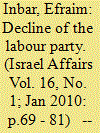

|
|
|
|
|
| Publication |
2010.
|
| Summary/Abstract |
This article presents the main reasons for the gradual decline, and eventually the marginalization, of the Labour Party. It starts with a general discussion of the decline of dominant parties in democratic political systems followed by a review of Labour's decline. Then it proceeds to analyze in detail the reasons for Labour losing its centrality in Israeli politics. The article concludes with a few thoughts about the future of Israeli politics.
|
|
|
|
|
|
|
|
|
|
|
|
|
|
|
|
| 3 |
ID:
130491
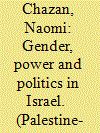

|
|
|
|
|
| Publication |
2011.
|
| Summary/Abstract |
The story of women, politics and power in Israel is fraught with anomalies. Women have traditionally been active participants in the public sphere, but their power has been consistently constrained. They have suffered from systematic underrepresentation, but as their number in the formal political arena has grown, their substantive impact has waned. And while they have scored significant achievements, gender inequality endures. Never have these inherent contradictions been more apparent than during the past decade, when the rising political clout of women has not been translated into sustained power, their increased political presence into effective influence, or their tangible legislative gains into significant socioeconomic progress. These trends highlight not only the ongoing impact of chauvinistic, militaristic and particularistic strains on Israeli politics in general and the depth of the recent move to the right in particular, but also the innovative potential of gender-rooted alternatives
|
|
|
|
|
|
|
|
|
|
|
|
|
|
|
|
| 4 |
ID:
170908


|
|
|
|
|
| Summary/Abstract |
The web of relationships between Israel, Germany, and Palestine is complex, especially because its historical coordinates are easy to decode, indeed obvious: That Germany committed monstrous crimes against the Jews in the 20th Century and that Jews carried out the Israeli state-building process on the backs of the Palestinians is evident. However, the question arises of the causal relations between both historical events and their relevance for the current
web of relationships. The foundation of the Zionist State is based on the urgency of a sanctuary for Jews as a consequence of the Shoah (Holocaust) and accelerated by the international consensus in its favor. Therefore, the connection between the Shoah and Israel arises by itself. However, consequently, as well with the necessary adaptation made, the connection of the Palestinians to Germany: If the foundation of Israel was a consequence of the Shoah caused by the Germans, this also implies a German connection with the historical injustice committed to the Palestinians by Jews through the founding of the state.
|
|
|
|
|
|
|
|
|
|
|
|
|
|
|
|
| 5 |
ID:
123633
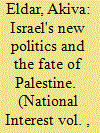

|
|
|
|
|
| Publication |
2012.
|
| Summary/Abstract |
SEEMINGLY, IT was a historic moment. The prime minister of Israel and leader of the Likud Party publicly embraced the two-state solution. A short while into his second term in office, ten days after the newly inaugurated president of the United States promised in Cairo to "personally pursue this outcome," Netanyahu declared an about-face, shifting from the traditional course he and his political camp had once pursued.
|
|
|
|
|
|
|
|
|
|
|
|
|
|
|
|
| 6 |
ID:
115344
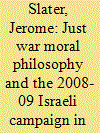

|
|
|
|
|
| Publication |
2012.
|
| Summary/Abstract |
The 2008-09 Israeli military campaign in Gaza, commonly known as Operation Cast Lead, is best understood in the context of Israel's "iron wall" strategy. During the 1930s, the strategy emphasized the need for overwhelming military power to break Arab resistance to the establishment of a Jewish state in Palestine; since the creation of Israel in 1948, it has continued to be at the core of Israeli policies in the overall Arab-Israeli conflict. From the outset, the strategy has included attacks on civilians and their crucial infrastructures. Such attacks violate the just war moral principles of discrimination and noncombatant immunity. In addition, Cast Lead violated the just war principles of just cause and last resort, which state that wars must have a just cause and even then must be undertaken only after nonviolent and political alternatives have failed. Israel did not have a just cause in 2008-09, because its primary purpose was to crush resistance to its continuing de facto occupation and repression of Gaza. Further, Israel refused to explore the genuine possibility that Hamas was amenable to a two-state political settlement. Thus, the iron wall strategy and Operation Cast Lead, in particular, have been political as well as moral failures, undermining rather than serving Israel's genuine long-term security needs.
|
|
|
|
|
|
|
|
|
|
|
|
|
|
|
|
| 7 |
ID:
128057
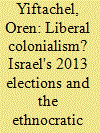

|
|
|
|
|
| Publication |
2013.
|
| Summary/Abstract |
Israel's 2013 Knesset elections, in which the incumbent ruling party was returned to power for the first time in a quarter-century, were noteworthy in several respects. The basic divisions of Israeli politics into geopolitical and socioeconomic blocs were unchanged, only small electoral shifts being registered. On the other hand, as this article shows, Prime Minister Benjamin Netanyahu barely achieved an electoral victory despite his overwhelming preponderance in public-opinion polls. Due to the rise of the new, personality-driven Yesh 'Atid party and the latter's unlikely alliance with the settler-based Jewish Home, which together garnered as many Knesset seats as the winning Likud-Yisrael Beitenu list, for the first time in decades Ultra-Orthodox parties were excluded from the winning governing coalitions for the first time in decades. The elections were marked by the near-invisibility of the Palestinian issue and Palestinian citizens of Israel. The article concludes that the continuing governing consensus in favor of "liberal colonialism" is unsustainable, although exploiting the "cracks" in that consensus is difficult and unlikely in the short term.
|
|
|
|
|
|
|
|
|
|
|
|
|
|
|
|
| 8 |
ID:
144677
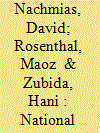

|
|
|
|
|
| Summary/Abstract |
Israeli national parties show a high variance in their tendency to compete in local elections for local authorities’ mayoral position and council seats. Indeed national parties can use local electoral competition to garner support for national elections. However, national parties might be also exposed to local losses and commitments which will hurt their performance in national elections. The results of Israeli ballot-box data from the 2006 national and the 2008 local elections show that Israeli national parties’ decision whether to compete in local elections is affected by the local support patterns in national elections, parties’ valence and the locality’s peripherality.
|
|
|
|
|
|
|
|
|
|
|
|
|
|
|
|
| 9 |
ID:
106312
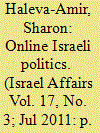

|
|
|
|
|
| Publication |
2011.
|
| Summary/Abstract |
This article describes how Israeli parliamentarians, political parties and candidates, as well as audiences use the Internet. Utilizing empirical data, the article analyzes the use of online media by candidates and incumbents and reviews the diverse applications they employ.
|
|
|
|
|
|
|
|
|
|
|
|
|
|
|
|
| 10 |
ID:
137549


|
|
|
|
|
| Summary/Abstract |
The electoral success of Yair Lapid's Yesh Atid party in the 2013 Knesset elections is discussed in this article as a test case of a worldwide phenomenon of celebrities, among them media personalities, who enter the political field. Bourdieu's interpretive research framework regarding symbolic and social capitals, as well as media capital, is used here to analyse Lapid's versatile career and celebrity status as the background to his performance during the campaign and his ability to win 19 seats in the Knesset. The article also places Lapid's case in the context of political and social developments in Israel in the last decades.
|
|
|
|
|
|
|
|
|
|
|
|
|
|
|
|
| 11 |
ID:
126976


|
|
|
|
|
| Publication |
2011.
|
| Summary/Abstract |
The article offers information on the report titled "Unsafe Space: The Israeli Authorities' Failure to Protect Human Rights Amid Settlement in East Jerusalem," published by the Association for Civil Rights in Israel (ACRI). The document aims to cite testimonies of Palestinian residents who are struggling and to unfold the repeated failure of the authorities to provide for all residents of Jerusalem. Issues related to human rights, hostility, and physical aggression are discussed
|
|
|
|
|
|
|
|
|
|
|
|
|
|
|
|
| 12 |
ID:
091799


|
|
|
|
|
| Publication |
2009.
|
| Summary/Abstract |
Focusing primarily on Israeli voter attitudes with respect to the Zionist-Palestinian conflict, this paper argues that the results of the 2009 elections highlight the structural entanglement of Israeli politics within a colonialist process of "creeping apartheid" not only in the West Bank but in Israel proper. The elections also demonstrated the continuing relevance of identity and class politics among Israeli voters and the trend among culturally and economically marginalized groups to support the colonialist agendas set mainly by the settlers, the military, and parts of the globalizing economic elites. In parallel, election results among Palestinians in Israel reflect their growing alienation from a political system that structurally excludes them from political influence.
|
|
|
|
|
|
|
|
|
|
|
|
|
|
|
|
|
|
|
|
|